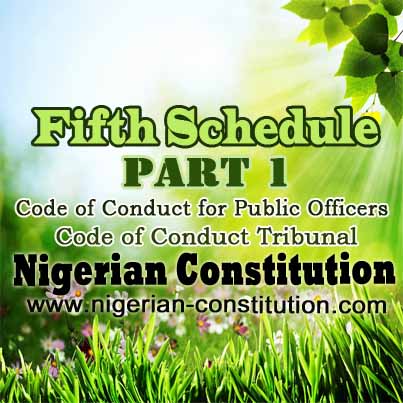15. (1) There shall be established a tribunal to be known as Code of Conduct Tribunal which shall consist of a Chairman and two other persons.
(2) The Chairman shall be a person who has held or is qualified to hold office as a Judge of a Court of record in Nigeria and shall receive such remuneration as may be prescribed by law.
(3) The Chairman and members of the Code of Conduct Tribunal shall be appointed by the President in accordance with the recommendation of the National Judicial Council.
(4) The National Assembly may by law confer on the Code of Conduct Tribunal such additional powers as may appear to it to necessary to enable it more effectively to discharge the functions conferred on it in this Schedule.
16. (1) The tenure of office of the staff of the Code of Conduct Tribunal shall, subject to the provisions of this Code, be the same as that provided for in respect of officers in the civil service of the Federation.
(2) The power to appoint the staff of the Code of Conduct Tribunal and to exercise disciplinary control over them shall vest in the members of the Code of Conduct Tribunal and shall be exercisable in accordance with the provisions of an Act of the National Assembly enacted in that behalf.
17. (1) Subject to the provisions of this paragraph, a person holding the office of Chairman or member of the Code of Conduct Tribunal shall vacate his office when he attains the age of seventy years.
(2) A person who has held office as Chairman or member of the Code of Conduct Tribunal for a period of not less than ten years shall, if he retires at the age of seventy years, be entitled to pension for life at a rate equivalent to his last annual salary in addition to other retirement benefits to which he may be entitled.
(3) A person holding the office of Chairman or member of the Code of Conduct Tribunal shall not be removed from his office or appointment by the President except upon an address supported by two-thirds majority of each House of the National Assembly praying that he be so removed for inability to discharge the functions of the office in question (whether arising from infirmity of mind or body) or for misconduct or for contravention of this Code.
(4) A person holding the office of Chairman or member of the Code of Conduct Tribunal shall not be removed from office before retiring age save in accordance with the provisions of this Code.
18. (1) Where the Code of Conduct Tribunal finds a public officer guilty of contravention of any of the provisions of this Code it shall impose upon that officer any of the punishments specified under sub-paragraph (2) of this paragraph and such other punishment as may be prescribed by the National Assembly.
(2) The punishment which the Code of Conduct Tribunal may impose shall include any of the following ¬
(a) vacation of office or seat in any legislative house, as the case may be;
(b) disqualification from membership of a legislative house and from the holding of any public office for a period not exceeding ten years; and
(c) seizure and forfeiture to the State of any property acquired in abuse or corruption of office.
(3) The sanctions mentioned in sub-paragraph (2) hereof shall be without prejudice to the penalties that may be imposed by any law where the conduct is also a criminal offence.
(4) Where the Code of Conduct Tribunal gives a decision as to whether or not a person is guilty of a contravention of any of the provisions of this Code, an appeal shall lie as of right from such decision or from any punishment imposed on such person to the Court of Appeal at the instance of any party to the proceedings.
(5) Any right of appeal to the Court of Appeal from the decisions of the Code of Conduct Tribunal conferred by sub-paragraph (4) hereof shall be exercised in accordance with the provisions of an Act of the National Assembly and rules of court for the time being in force regulating the powers, practice and procedure of the Court of Appeal.
(6) Nothing in this paragraph shall prejudice the prosecution of a public officer punished under this paragraph or preclude such officer from being prosecuted or punished for an offence in a court of law.
(7) The provisions of this Constitution relating to prerogative of mercy shall not apply to any punishment imposed in accordance with the provisions of this paragraph.



